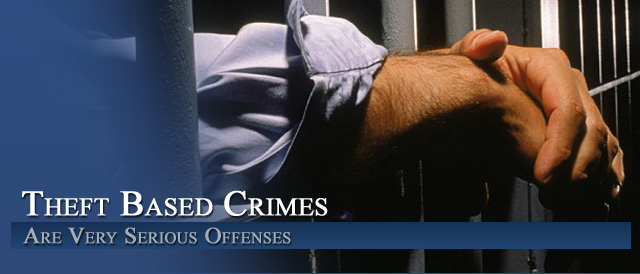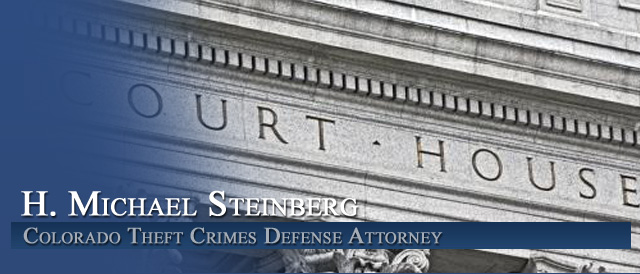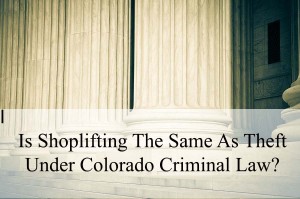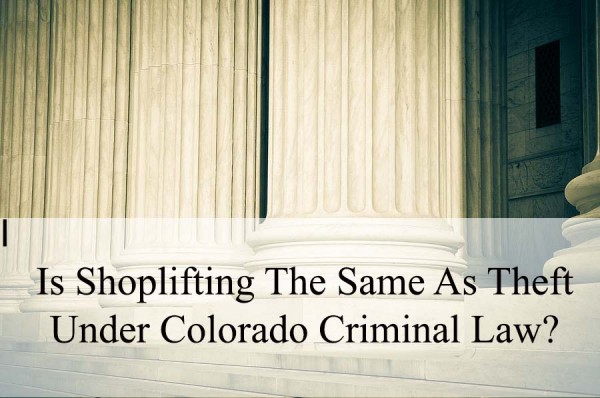




Is Shoplifting The Same As Theft Under Colorado Criminal Law?
By H. Michael Steinberg Colorado Theft Crimes Criminal Defense Lawyer – Attorney
 Is Shoplifting The Same As Theft Under Colorado Criminal Law? – ” I never left the store – how can I be charged with shoplifting – isn’t that a form of theft? ” The answer is yes and no. This article helps to draw important distinctions between the crime of shoplifting and theft under Colorado law.
Is Shoplifting The Same As Theft Under Colorado Criminal Law? – ” I never left the store – how can I be charged with shoplifting – isn’t that a form of theft? ” The answer is yes and no. This article helps to draw important distinctions between the crime of shoplifting and theft under Colorado law.
While the crime of theft can include the crime of shoplifting, under sections18-4-401 and 18-4-403 of the Colorado Revised Statutes, the reverse may not be true. Shoplifting can be charged when a person is arrested within a store after concealing merchandise. Theft is charged when the person is apprehended and arrested after leaving the store.
The key difference – and where the confusion lies is – theft is charged when the suspect leaves the store carrying away the items with the intent to deprive.
Comparing The Colorado State Code Crime Of Theft vs Colorado Municipal Laws On Shoplifting
What follows is the law governing the Colorado Crime of Theft 18-4-401
Section 18-4-401 C.R.S. Theft.
(1) A person commits theft when he or she knowingly obtains, retains, or exercises control over anything of value of another without authorization or by threat or deception; or receives, loans money by pawn or pledge on, or disposes of anything of value or belonging to another that he or she knows or believes to have been stolen, and:
(a) Intends to deprive the other person permanently of the use or benefit of the thing of value;
(b) Knowingly uses, conceals, or abandons the thing of value in such manner as to deprive the other person permanently of its use or benefit;
(c) Uses, conceals, or abandons the thing of value intending that such use, concealment, or abandonment will deprive the other person permanently of its use or benefit;
(d) Demands any consideration to which he or she is not legally entitled as a condition of restoring the thing of value to the other person; or
(e) Knowingly retains the thing of value more than seventy-two hours after the agreed-upon time of return in any lease or hire agreement.
(1.5) For the purposes of this section, a thing of value is that of “another” if anyone other than the defendant has a possessory or proprietary interest therein.
….
What follows is the law governing the Colorado Crime of Shoplifting under the Aurora Municipal Code –
Aurora Municipal Code Section 94-74. – Theft.
[HMS – The focus is on Section 5 ( c )]:(a) A person commits theft when he or she knowingly obtains, retains, or exercises control over anything of value of another having a value of less than $2,000.00 without authorization or by threat or deception; or receives, loans money by pawn or pledge on, or disposes of anything of value or belonging to another that he or she knows or believes to have been stolen; and
(1) Intends to deprive the other person permanently of the use or benefit of the thing of value;
(2) Knowingly uses, conceals, or abandons the thing of value in such manner as to deprive the other person permanently of its use or benefit;
(3) Uses, conceals, or abandons the thing of value intending that such use, concealment, or abandonment will deprive the other person permanently of its use or benefit; or
(4) Demands any consideration to which that person is not legally entitled as a condition of restoring the thing of value to the other person.
(5) Knowingly retains the thing of value more than 72 hours after the agreed-upon time of return in any lease or hire agreement.
(b) It shall be unlawful to knowingly transfer a label or other designation of price from one item to another or alter the item with intent to purchase such item at a lesser cost.
(c) If any person willfully conceals unpurchased goods, wares, or merchandise owned or held by and offered or displayed for sale by any store or other mercantile establishment, whether the concealment is on that person’s own body, clothing or otherwise and whether on or off the premises of the store or mercantile establishment, such concealment shall constitute prima facie evidence that the person intended to commit the crime of theft.
….
To further understand the comparative legal relationship between shoplifting and larceny – a closer look at the two crimes is necessary
In the more common vernacular the Crime of Theft requires proof that a Defendant has:
(1) taken
(2) personal property that is
(3) in the possession of another, and
(4) has carried it away
(5) without consent and
(6) with the intent to deprive the possessor of it permanently, while
(7) knowing that he or she was not entitled to it.
The Application Of The Double Jeopardy Doctrine Adds Some Clarity
If a person conceals an item and then walks out of a store with the item without paying for it – technically they may be charged with BOTH shoplifting and theft. The doctrine of Double Jeopardy would not prohibit it. As a practical matter – even though it would be possible to charge both crimes – the two crimes are almost never charged together.
The reason that Double Jeopardy does not apply is that in the sequence of actions just described the two offenses are committed at one time and are separate as each crime “requires proof of an additional fact which the other does not.”
Theft, for example, requires “proof of the intent to deprive,” while shoplifting requires “proof of concealment.” Put differently shoplifting, if it charged under the “concealment option” above – is like an attempted or incomplete theft. That is where the confusion lies – as it is commonly understood that a person has to leave the store with merchandise before ANY crime is committed.
The crime of theft follows the “last point of sale rule.” If a person carries unpaid merchandise past the last point of sale (usually the cash registers at the front of the store) that is interpreted as evidence that that the person intended to steal the merchandise – that is theft under State law.
Merchants are permitted to detain and question individuals if the merchants have reason to believe that a suspected shoplifter has concealed merchandise without having carried away that merchandise past the “last point of sale.”
Best Example “Concealment” Under Aurora Municipal Code Section 94-64
…..
(c) If any person willfully conceals unpurchased goods, wares, or merchandise owned or held by and offered or displayed for sale by any store or other mercantile establishment, whether the concealment is on that person’s own body, clothing or otherwise and whether on or off the premises of the store or mercantile establishment, such concealment shall constitute prima facie evidence that the person intended to commit the crime of theft.
Example 2: Denver Municipal Code Section 38-51.5
Sec. 38-51.5. – Shoplifting unlawful; retail theft.
It shall be unlawful for any person to take or conceal or exercise control over any goods, wares or merchandise (property) of another which is displayed or in any other manner offered for sale and which has an aggregate value of less than one thousand dollars ($1,000.00), when the person intends to avoid payment for the merchandise or knowingly deprives the person entitled to possession of the property of the use and benefit of the property.
Example 3: Thornton Municipal Code Sec. 38-176. – Shoplifting And Theft
Sec. 38-176. – Shoplifting.
(a) Unlawful actions.
(1) It is unlawful for any person to conceal or to aid, abet or assist another person to conceal unpurchased goods, products or merchandise that are owned, held or displayed for sale by any retail outlet, store or other mercantile establishment, with the intent to avoid payment therefor.
Thornton Municipal Code Sec. 38-176. -Theft
Sec. 38-177. – Theft.
(a) It shall be unlawful for any person knowingly to obtain or exercise control over anything of value of another without authorization or by threat or deception or knowing the thing of value to have been stolen, when the person who so obtains or exercises control over the thing of value:
(1) Intends to deprive the other person permanently of the use or benefit of the thing of value;
(2) Knowingly uses, conceals or abandons the thing of value in such manner as to deprive the other person permanently of its use or benefit;
(3) Uses, conceals or abandons the thing of value intending that such use, concealment or abandonment will deprive the other person permanently of its use and benefit; or
(4) Demands any consideration to which the person is not legally entitled as a condition of restoring the thing of value to the other person.
(b) This section shall not apply if the value of the thing involved is $2,000.00 or more.
Is Shoplifting The Same As Theft Under Colorado Criminal Law?
If you found any of the information I have provided on this web page article helpful please click my Plus+1 or the Share buttons for Twitter and Facebook below so that others may also find it.
The reader is admonished that Colorado criminal law, like criminal law in every state and at the Federal level, changes constantly. The article appearing above was accurate at the time it was drafted but it cannot account for changes occurring after it was uploaded.
If, after reading this article, you have questions about your case and would like to consider retaining our law firm, we invite you to contact us at the Steinberg Colorado Criminal Defense Law Firm – 303-627-7777.
Never stop fighting – never stop believing in yourself and your right to due process of law. You will not be alone in court, H. Michael at your side every step of the way – advocating for justice and the best possible result in your case.
 ABOUT THE AUTHOR: H. Michael Steinberg – Email The Author at [email protected]om – A Denver Colorado Criminal Defense Lawyer – or call his office at 303-627-7777 during business hours – or call his cell if you cannot wait and need his immediate assistance – 720-220-2277. Attorney H. Michael Steinberg is passionate about criminal defense. His extensive knowledge and experience of Colorado Criminal Law gives him the edge you need to properly handle your case.
ABOUT THE AUTHOR: H. Michael Steinberg – Email The Author at [email protected]om – A Denver Colorado Criminal Defense Lawyer – or call his office at 303-627-7777 during business hours – or call his cell if you cannot wait and need his immediate assistance – 720-220-2277. Attorney H. Michael Steinberg is passionate about criminal defense. His extensive knowledge and experience of Colorado Criminal Law gives him the edge you need to properly handle your case.
“A good criminal defense lawyer is someone who devotes themselves to their client’s case from beginning to end, always realizing that this case is the most important thing in that client’s life.”
You should be careful to make a responsible choice in selecting a Colorado Criminal Defense Lawyer – and we encourage you to “vet” our firm. Over the last 40 plus years – by focusing ONLY on Colorado criminal law – H. Michael has had the necessary time to commit to the task of constantly updating himself on nearly every area of criminal law, to include Colorado criminal law and procedure and trial and courtroom practice. H. Michael works hard to get his clients the best possible results in and out of the courtroom. He has written, and continues to write, extensively on Colorado criminal law and he hopes this article helps you in some small way – Is Shoplifting The Same As Theft Under Colorado Criminal Law?

Other Articles of Interest:
- Concealment of Goods 18-4-406 and Questioning of Persons Suspected of Theft 18-4-407
- Colorado Shoplifting Law – How Far Can The Store Go To Make An Arrest?
- Colorado Shoplifting Laws And Common Defenses To Colorado Shoplifting Crimes Part I of II
- Colorado Shoplifting Laws And Common Defenses To Colorado Shoplifting Crimes Part II of II
- Colorado Theft Crimes 18-4-401












